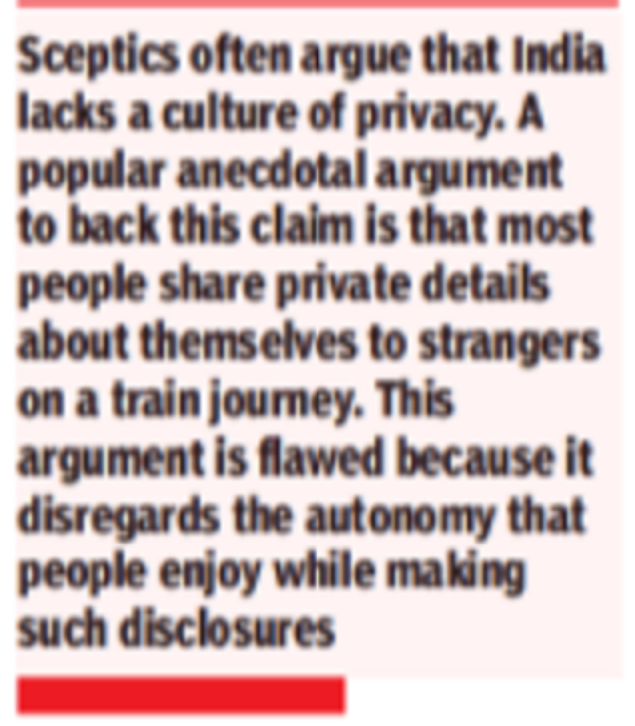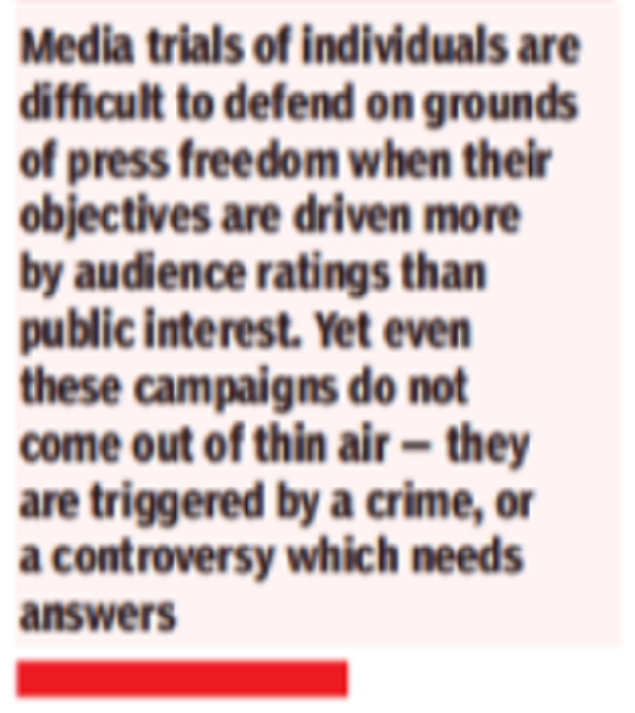For: Jahnavi Sindhu
Defamation is used to suppress the press but ignoring privacy cannot be the solution
Shilpa Shetty’s recent defamation lawsuit joins a growing list of cases where press freedom and privacy have locked horns due to sensational reporting in the midst of a criminal investigation. Justice Gautam Patel’s careful approach to the case, where he directed the removal of videos related to inherently personal aspects of Shetty’s life, shows why in certain situations privacy should prevail over freedom of the press.

However, this anecdotal argument is flawed because it disregards the autonomy that people have when revealing some or all of their lives to people they have just met. The right to privacy protects exactly this—the right to choose how and when our personal information is set aside.
In 2017, a nine-judge bench Supreme Court in Puttaswamy Established privacy as a fundamental right. NS scheduled caste argued that privacy was necessary to realize the right to live a dignified life that included the right to fully develop one’s personality and to exercise freedom of thought, both for “autonomy over individual choices and personal control over the dissemination of information”.
while sc puttaswamy Primarily concerned with government invasion of privacy, the case’s logic provides guidance for private litigation, where press freedom and privacy conflict. The SC held that individuals have a reasonable expectation of confidentiality, that certain matters remain private and that individuals are given a “zone of privacy” where they are free from public scrutiny and judgment.
In fact, a celebrity may not have the same expectation of privacy as other individuals, but her public persona and the resulting interest in her private life cannot eliminate this expectation completely. The Court’s observation to this effect in Shetty’s case is a significant step forward in Indian privacy jurisprudence.
While trying to balance privacy and press freedom, it is important to consider the rationale behind freedom of the press. As the Supreme Court pointed out in the Indian Express case (1985), freedom of the press exists for the benefit of citizens in a democracy and aims to “advance the public interest by publishing facts and ideas from various sources” without which a democratic Voters cannot take responsible decisions.”
Even in a defamation suit, a claim for freedom of the press will prevail over privacy if there is a public interest in the information. Lady Hale said in the House of Lords decision that this “is different from saying that it is information that is in the public interest – the most no-nonsense–about the activities of footballers’ wives and girlfriends – in the bulk of the public”. It is about class interests but no one could claim genuine public interest in telling everything about us.” English courts have often had to erase this distinction. The court indemnified Naomi Campbell for disclosing details of her drug addiction treatment as well as photos of her coming out of the center. Recently Meghan Markle won a privacy claim against a newspaper that published a letter to her father on the grounds that she had a reasonable expectation that the letter would not be disclosed.
Similarly, in Shetty’s case, the court took issue with the reports regarding her upbringing, but did not stop the publication of the reports relating to the criminal investigation against her husband. While the net of public interest is spread far and wide, the recent trend of disclosure by news channels WhatsApp The conversations of public figures and activists about mental health issues and private conversations with friends are unlikely to satisfy the limit. Recently, the SC has also cautioned the media against the practice of ‘selective’ or incomplete leaks during criminal investigations.
It is true that defamation lawsuits are often used to influence the media. The solution is not to completely ignore the right to privacy, but to prevent abuse through strong judicial oversight and safeguards provided under the defamation law. In Shetty’s case, the court achieved this balance by noting that any exception to free speech should be narrowly tailored, that each defendant should be treated individually and that the order was to be a false order on the press. should not be considered. Furthermore, rapid judicial oversight often results in the media self-regulating and removing content that does not meet the limits of public interest, as was the case with Shetty. For the right to privacy to be taken seriously, it is imperative that the same standards by the judiciary apply to similar cases brought by ordinary individuals, not just celebrities.
(Author is a lawyer specializing in constitutional law)
Against: Sevanti Ninani
The media has a right to report, and the public has a greater right to know
The right to privacy of individuals is currently more protected in this country than the freedom of the press. The Constitution guarantees the right to privacy, and the Puttaswamy judgment of 2017 (Justice KS Puttaswamy v Union of India) interpreted it as a fundamental right. However, freedom of the press is neither guaranteed nor is it a fundamental right. It is a part of the right to freedom of speech and expression in the Constitution, which is surrounded by reasonable restrictions. However it is worth noting that confidentiality is not one of the seven grounds mentioned for imposing reasonable restrictions.
The right to report is partly about demanding accountability which is the job of the media, and partly about the public’s greater right to know.

Even without privacy legislation, a body of decisions has been made over the years, with courts sometimes defining privacy in a way that allows public persons to be scrutinized more closely.
An important 1994 judgment, R Rajagopal v State of Tamil Nadu, relating to freedom of the press versus the right to privacy, did three things. It defined privacy as: “A citizen has the right to protect the privacy of himself, his family, marriage, reproduction, motherhood, childbearing and education in other matters.” It denied the protection of privacy to public officials claiming the right to privacy for their official duties, and also upheld the right of the press to publish such material that appeared in the public record.
In this colorful case, the editors of Nakkhiran, a magazine, demanded the state of Tamil Nadu to stop the publication of the autobiography of a condemned prisoner Auto Shankar in their magazine. He was on death row for six murders. The manuscript details a nexus between a prisoner and government officials in several crimes, with a video cassette and incriminating photographs available as evidence. The prisoner was then pressurized by the state government to withdraw the permission for publication and refuse to write the book.
This judgment was also used in later cases to deny publication of material not on public record, such as personal interviews in the biographies of Phoolan Devi, Jayalalithaa and Veerappan, due to the reference to publication material from public record.
The privacy versus press freedom argument is a layered one. In practice, the bar for privacy is higher for private individuals, including children. The notion of a “public person” is the one used in Indian courts and Press Council of IndiaIdentify the norms of journalistic conduct. information sought under right to Information Work done by journalists or citizens will be treated differently in the case of public persons, SC says ‘CPIO, supreme court of india Vs Subhash Chandra Agarwal’.
The right to privacy was also tested by the publication of radia tape, on the basis of telephone tapping authorized by the Income Tax Department. But some would argue that the revelations that emerged were not in the public interest in the context of the unfolding alliance.
The most recent attempt to balance the public’s right to know with the individual’s right to privacy is to be found in the Bombay High Court order in the Shilpa Shetty case. The actress has been demanding restraint on media reporting following the arrest of her businessman husband in a pornography case. The single-judge bench declined to issue a blanket gag order, but ordered the removal of some defamatory videos.
It was noted that Shetty’s prayer would have a cooling effect on the freedom of the press. He was also told that the media could not be stopped from reporting on him because he had chosen a public life that put him under the microscope. On privacy, the order states that the right to report does not override the right to privacy, noting that “just because Shilpa Shetty is a public figure, it does not mean that she has protected the privacy as guaranteed under the Constitution.” rights have been relinquished.”
Meanwhile, a personal data protection bill is currently waiting to be passed. Government officials have the right to forget it to protect them from the use of past data related to them. Overall, this bill could present new challenges to reporting if passed.
(The author is a media columnist and commentator)
.